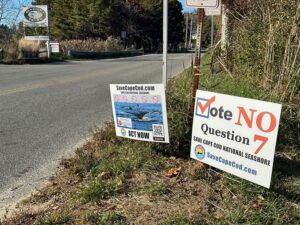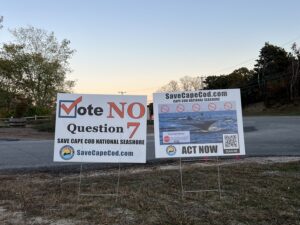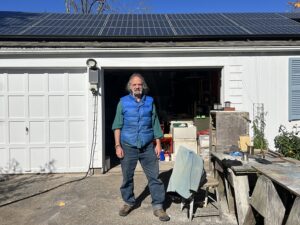WELLFLEET — An anonymous campaign against the nonbinding ballot Question 7, which appeared only on state election ballots in Provincetown, Truro, Wellfleet, Eastham, Orleans, Chatham, and Harwich last November, has now filed its required finance statements with the state’s Office of Campaign and Political Finance (OCPF). The statements, filed on Dec. 16, were due before election day, Nov. 5.

The “Vote NO Question 7” signs that appeared on roadways around the Outer and Lower Cape were paid for by Wellfleet resident Lilli-Ann Green.
Green is Wellfleet’s representative on both the Barnstable County Assembly of Delegates and the Cape Cod National Seashore Advisory Commission. She is also vice chair of the town’s energy and climate action committee. She is an outspoken opponent of wind energy.
Question 7 asked voters in the legislature’s Fourth Barnstable District to direct their state representative to “support offshore and onshore wind power developments in Massachusetts.” Forty-four percent of voters in the district voted for the question while 49 percent voted against it.
The question had been placed on the ballot by John Leonard of Hingham, who said he gathered the required 200 signatures in one weekend. Neither Leonard nor anyone else ran a “Vote Yes” campaign, but “Vote NO Question 7” signs proliferated. They referred to a website, SaveCapeCod.com, that also did not have an identified owner. Many of the signs remain on the sides of local roads.
According to Jason Tait, communications and education director at OCPF, there is no “tracking mechanism” for independent expenditures, but individuals who raise or spend money on a ballot question have an obligation to report those activities to the state.
“If OCPF is made aware that money has been spent by individuals independent from a committee, and there is no disclosure, we work to contact individuals and then provide disclosure,” Tait told the Independent in an email.
Tait would not say how OCPF became aware that Green was responsible for the signs. The SaveCapeCod.com website existed before her campaign against Question 7.
Green’s signs were printed at VistaPrint and Staples and cost a total of $1,697, according to her financial disclosure, which she filed on Dec. 16.
Campaign finance deadlines vary by the type of campaign, but expenditures are generally supposed to be reported before election day, with especially late expenditures being reported shortly after election day.
In a brief phone call, Green said she created the signs in October because she had been “personally concerned” about the lack of information about Question 7 and wanted to educate voters about it.
“The report was filed as soon as I understood that even a personal expenditure in opposition to a ballot question must be disclosed,” said Green.
Green would not say why she had conducted the campaign anonymously and did not respond to further questions from a reporter.
According to Tait, OCPF has the authority to issue fines for late financial reports, but none have been levied in this instance. The decision on whether or not to issue a fine is made on a “case-by-case basis,” he said.
Worries About Viewsheds
Green has spoken publicly in opposition to offshore wind development — including at a meeting hosted by the Bureau of Ocean Energy Management (BOEM) in Eastham last July and a “wind energy informational” meeting hosted by Maine-based anti-wind advocate Jerry Leeman at the Truro Public Library in September.
At the BOEM meeting, Green delivered a long statement against wind energy that referenced the founding documents of the Cape Cod National Seashore as well as the 1916 Organic Act.
“The viewshed needs to be maintained for future generations,” she said. If wind turbines are installed “and anyone sees these wind turbines off of the Cape Cod National Seashore, that could be the floodgate for national parks anywhere and national seashores anywhere to have their viewsheds industrialized.”
Some audience members applauded her comments at the July meeting.
Question 7 has no legal effect on the future of wind power in Massachusetts, but other elections decided last November will. The future of offshore wind development, including in the Gulf of Maine, is currently in doubt, as a series of decisions and authorizations must be made by federal agencies.
Last week, President-elect Donald Trump said his administration is “going to have a policy where no windmills are being built.”


